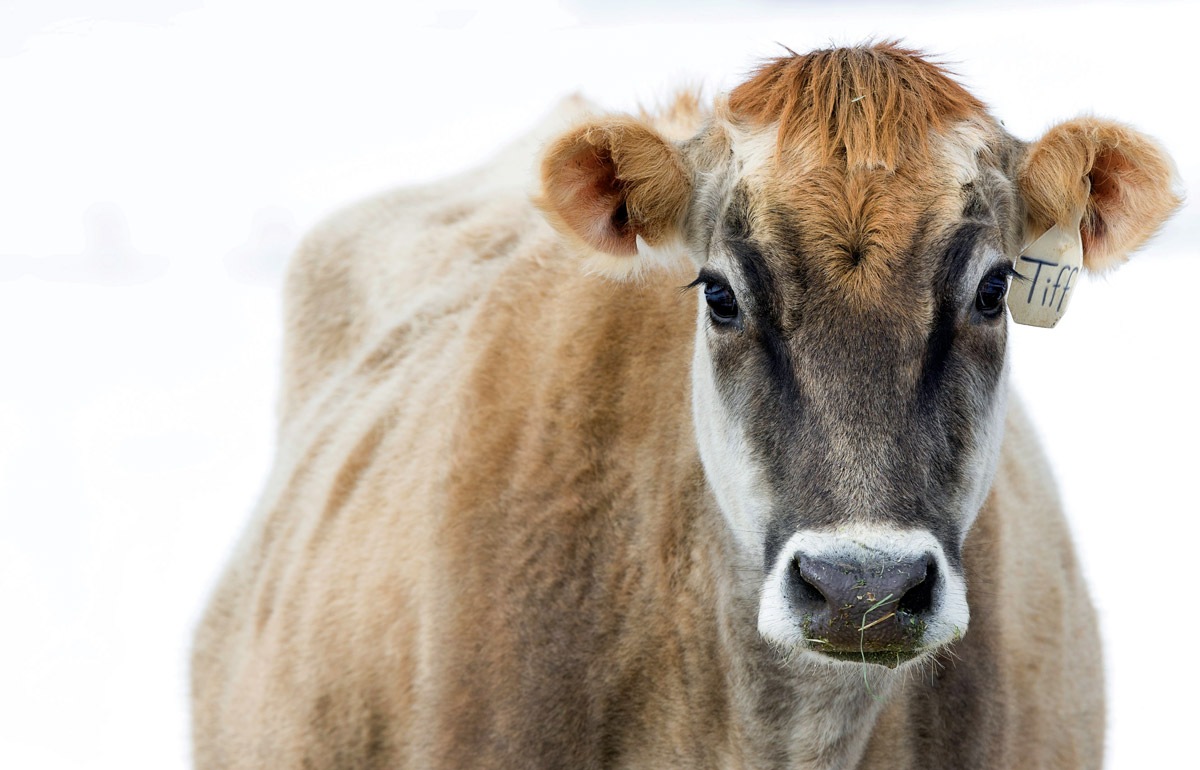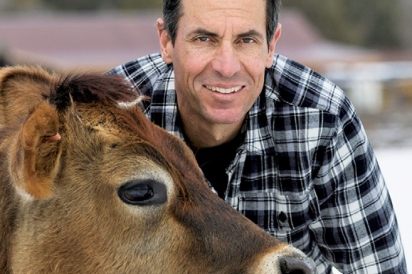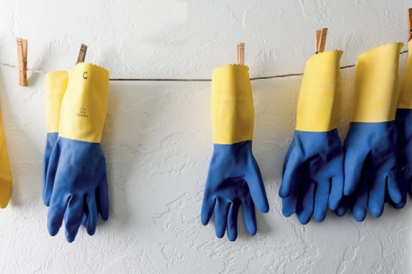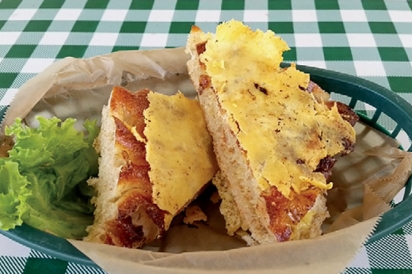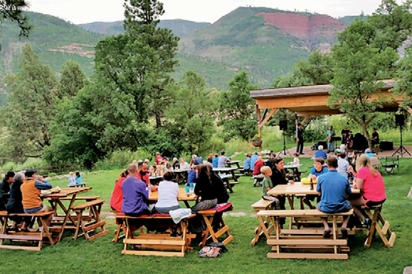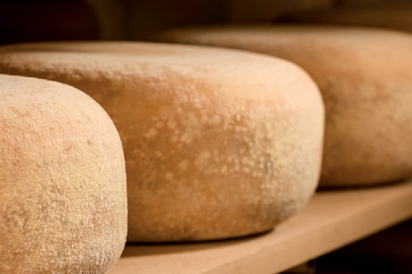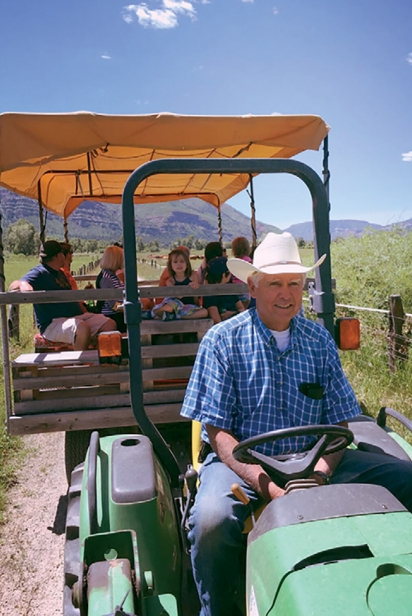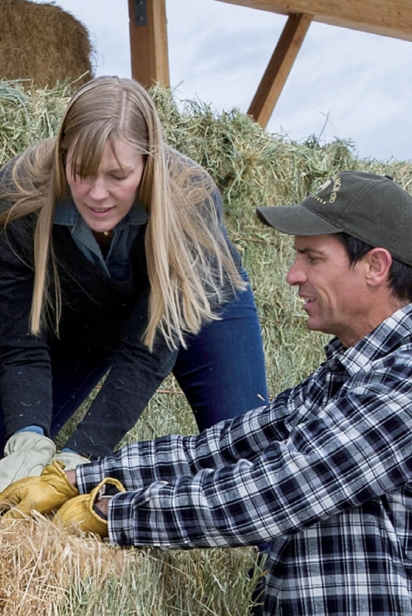Home, James.
One of America’s most talented cheesemakers finds inspiration on his family’s Durango cattle ranch.
It’s a bluebird day in the Animas River Valley, 10 miles north of Durango. Dan James emerges from his 900-square-foot creamery, where he handcrafts three exquisite raw cow’s milk cheeses—including Belford, an award-winning, buttery Dutch farmhouse-style—from 100 percent grassfed milk redolent of the lush pasture on his family’s namesake ranch.
James, 48, strides across the lawn to greet me. Soon we’re at a table, spooning up mouthfuls of ice cream made with that same luxurious milk, and mint plucked from the on-site organic gardens. Around us, patrons of the ranch’s Harvest Grill & Greens food cart and adjacent farm store are picnicking, or watching their offspring shriek with delight as they toddle after chickens in search of crumbs.
As a former ranch kid myself, I savor the idyllic atmosphere, but my admiration for this family goes back to 2005, when I first met patriarch Dave James. I was living in Telluride; he was selling his grassfed beef and pastured, whey-fed heritage pork at the farmers’ market. I was captivated by the then-sexagenarian’s easy-going demeanor and ready smile, as well as his ethos of humane livestock management and “beyond organic” farming methods. Later that summer I tried his son Dan’s cheeses, and my opinion of the family skyrocketed. Dan James just may be the best cheesemaker you’ve never heard of.
A ranching legacy
While Dan James has received accolades for his cheeses, their limited distribution has kept his name and products something of a secret. “When I started the creamery, we weren’t looking for distribution outside of Colorado,” he says. “Our focus is to supply our local community first.”
Supporting and engaging community is central to what the James Ranch does: land stewardship and multi-generational family agricultural endeavors, most of which center around their seasonal livestock operation. To fully understand Dan James’s story, however, more background is in order.
His parents, Dave and Kay James, still run the beef cattle operation; Dave’s father grew up on a Kansas subsistence farm. “My grandfather didn’t expose my dad or his siblings to farming,” says Dan James. “Ironically, he worked hard and became successful so that his children wouldn’t have to be in agriculture.”
Despite this, Dave was fascinated by farming. He spent summers working on ranches, and after he and Kay graduated from college they decided to start their own cattle operation. Surprisingly, the elder James was willing to finance the acquisition of the property. “He was wise enough to know that you should follow your passions in life, and he wanted that for my dad,” notes Dan James.
The couple purchased a 400- acre ranch outside of Durango in 1961, and spent 15 years in the commercial cattle industry with little success. They were eventually forced to develop 60 acres on the south end (today, it’s a desirable housing development). “My parents postponed their dream and instead became land developers, real estate agents and landscapers. That sacrifice enabled my siblings and future generations to inherit debt-free land,” James explains.
Four of the five grown children and their families live on-site, and are variously involved in the ranch’s entrepreneurial ventures. Says James, who along with wife, Becca, has three children, ages 10 to 15, “We’ve all been encouraged to travel and explore the world. That way, when and if we returned, it was on our terms. My parents welcomed us back, but told us to have a plan and our own enterprise.”
Two-thirds of the ranch is in conservation easements, in keeping with the family’s core value of holistic land management; they also offer tours in order to educate the public about their food supply. Around the time their children began showing an interest in returning home, Dave and Kay were introduced to the teachings of pioneering ecologist Allan Savory, the creator of holistic land management. Says James, “We loved the model and embraced it.”
“Cheesemaking wasn’t even on my radar”
Dan and Becca attended college in Seattle, where he studied fisheries management and business. “We wanted to raise our family on the ranch,” he says. “When it was clear that Durango was our path, fisheries were swapped for cows.” Two years later, the couple realized their goal. “You focus on what you want in your life first, and then work out how you’re going to achieve that.”
“I come from a beef cattle background—cheesemaking wasn’t even on my radar. I’d never milked a cow,” James laughs. “But we have a pure water supply, and great forage, which is crucial for a grassfed herd. Amazing milk is the foundation to great cheese, and grass is the basis of that.”
That milk comes from a pampered herd of 30 Jersey cows, which graze rotationally on a mix of timothy, orchard and other grasses and clovers; off-season forage is GMO- and spray-free and sourced regionally. The cows are moved three times a day in order to stimulate new plant growth, and milked only once a day, in keeping with the New Zealand grass-based dairy model the Jameses decided to emulate.
“Cutting back on milking positively affects the life of the animals, as well as the people involved,” explains James. The cows have New Zealand genetics, giving them a moderate-sized frame and wide muzzles better suited for grazing.
The dairy is certified by Animal Welfare Approved, a stringent third-party agency that “audits and supports independent family farmers raising their animals according to the highest animal welfare standards.” The herd is also hormone- and antibiotic-free.
James is primarily a self-taught cheesemaker, gifted with instincts some artisans never achieve in a lifetime, but he’s quick to deflect praise. “People say I’m a skilled cheesemaker, but that’s cheating. It’s almost impossible to screw up our milk.”
After taking two short cheesemaking courses, Dan and Becca took a trip abroad “to experience and eat a lot of cheese.” In 2001, back in Durango, they purchased a very patient Jersey named Dolly. After stovetop cheesemaking for a season, the couple built a creamery and aging room, adding a milking parlor in 2003.
The decision to focus on Dutch-style cheeses was the result of evaluating the customer base. “We realized we needed a mass-appeal product, but something special enough for high-end clientele and restaurants [which include Seasons of Durango, Eno Wine Bar and El Moro Tavern],” says James. They consulted with Dutch cheesemaker friends in New Zealand, and signature release Belford gained a following.
Beneath its waxed rind, Belford is dense and buttery, redolent of grass, with a residual tang. It’s sold as a young, mature and reserve cheese (aged three months, 18 months and three years, respectively). The latter is reminiscent of an aged Gouda, with notes of butterscotch and a pleasing crunch due to the development of amino acid crystals. Leyden is a domestic version of a traditional Dutch cheese studded with whole cumin seeds; aged six months, it exhibits creamy citrus notes.
Colorado Blue, the only cow's milk blue cheese in the state—debuted in late 2015. Made with summer milk, it ages between five and eight months, resulting in a well-balanced cheese with hints of cream and smoky mushroom flavors.” All three products are marketed as “table cheeses,” meant to be enjoyed with seasonal fruit and rustic bread, but they’re no less delicious in stratas, soufflés or salads, or the Harvest Grill’s succulent steak sandwich with Belford and caramelized onions.
As the ranch continues to evolve—this fall will begin an expansion of the farm store and Grill—so, too, will the relationship between the James family and their community.
As we bid farewell, James nods at the kids happily interacting with hens on the lawn. “The desire for the consumer to connect with their food supply is only gaining momentum. To see people— especially children—make that connection is one of the best parts of my job.”
GO FIND IT!
James Ranch
33444 Highway 550, Durango
JamesRanch.net
Guided tours by appointment.


